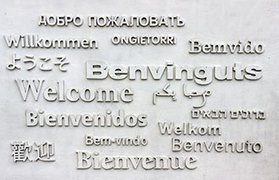 English (US) »
English (US) »
 esperanto
esperanto
| Learn Esperanto - First words | ||
|---|---|---|
| Hi! | Saluton! | |
| Hello! | Bonan tagon! | |
| How are you? | Kiel vi? | |
| Good bye! | Ĝis revido! | |
| See you soon! | Ĝis baldaŭ! | |
Facts about the Esperanto language
Esperanto is a constructed international auxiliary language created by L. L. Zamenhof in 1887. Aimed at fostering worldwide understanding and peace, it simplifies communication among speakers of different native languages. Unlike natural languages, Esperanto was designed with ease of learning in mind, featuring a regular and phonetic spelling system.
The vocabulary of Esperanto draws primarily from European languages, making it particularly accessible to those already familiar with Romance or Germanic tongues. Its grammar is notably simple and regular, devoid of exceptions, which accelerates the learning process. This simplicity allows learners to achieve fluency faster than with national languages.
Around the world, Esperanto has a dedicated community of speakers, though estimates vary widely. Some suggest there are hundreds of thousands of speakers, including a small number of native speakers who learned it from birth. These Esperantists often gather at international meetings and communicate online, sharing a unique cultural bond.
Esperanto culture is rich, with its own literature, music, and magazines. Over the years, original works as well as translations from various languages have been published in Esperanto. This cultural output helps to sustain the language’s vitality and provides materials for learners and fluent speakers alike.
Critics of Esperanto sometimes argue that it has failed to achieve its goal of becoming a universal second language. However, its supporters contend that the language has succeeded in building an inclusive, global community. They highlight the friendships and understanding that have formed across linguistic barriers as evidence of its value.
Despite the debates surrounding its utility, Esperanto remains a symbol of internationalism and peace. Its existence challenges the notion that understanding across cultures is unattainable. Through its continued use and the dedication of its speakers, Esperanto showcases the potential for a shared language to unite people.
Esperanto for beginners is one of over 50 free language packs that you can get from us.
‘50LANGUAGES’ is the effective way to learn Esperanto online and for free.
Our teaching materials for the Esperanto course are available both online and as iPhone and Android apps.
With this course you can learn Esperanto independently - without a teacher and without a language school!
The lessons are clearly structured and will help you achieve your goals.
Learn Esperanto fast with 100 Esperanto language lessons organized by topic.








